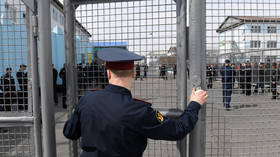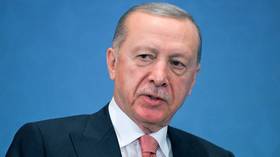Russian-Israeli citizen jailed for trying to join Ukrainian army

A Russian-Israeli citizen has been convicted on treason charges and sentenced to 11 years for attempting to join the Ukrainian military. Andrey Galchevsky, a 60-year-old businessman, insisted he had attempted to gain membership in a Ukrainian volunteer corps to be able to safely travel to Poland and Lithuania.
On Tuesday, TASS quoted a representative of a court in Kaliningrad Region as revealing that, on top of the prison term, Galchevsky will have to pay a 400,000 ruble ($4,280) fine. The man will also be prohibited from administering internet websites for two years.
According to court documents, Galchevsky sent e-mails to the Ukrainian embassies in Israel and Poland last summer, asking to be enlisted in the foreign legion of Kiev’s armed forces. He is believed to have purchased a ticket from Moscow to the capital of Belarus, Minsk, from where he was planning to go by bus to Vilnius. The man had also booked a hotel room in the Lithuanian capital.
However, Russian authorities detained Galchevsky last October before he managed to cross the border.
During the trial, the businessman pleaded partly guilty, admitting that he had gotten in touch with the Ukrainian diplomatic missions, and had indeed intended to leave Russia. However, he insisted that he had never planned to actually join the Ukrainian military, but rather wanted to use his status as an enlisted volunteer fighter to make traveling in Poland and Lithuania run more smoothly.
According to Galchevsky, he wanted to visit the Baltic state to “be baptized at a Mormon church in Vilnius.” As for neighboring Poland, the man said he intended to open a bank account and acquire a local card there, as well as apply for a visa at the US embassy.
In addition to treason, the businessman was found guilty of posting messages on Instagram, in which he called on other users to kill Russian military recruiters.
Explaining his actions online, Galchevsky said it was “stupidity” and that he had intended to attract the attention of Russian authorities in the hope that this would expedite the process of them making a decision “regarding his departure from the Russian Federation.”
Court documents said that the man was sane and was aware of the nature of his actions.














